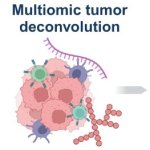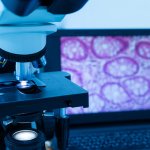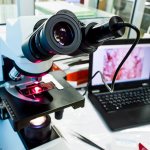
News • Tailored chatbot
Customized ChatGPT to advance digital pathology
New research shows that the AI large language model ChatGPT can be tailored to provide accurate responses to questions about digital pathology and compile detailed results.

Step aside, glass slides: Digital pathology opens up a whole new world of possibilities in diagnosis, prognosis, and prediction of diseases, which is only furthered by the use of AI and Machine Learning. In our information channel, we have assembled some of the most exciting applications for digital pathology.

New research shows that the AI large language model ChatGPT can be tailored to provide accurate responses to questions about digital pathology and compile detailed results.

Digital pathology can be used to great effect in pharmaceutical research: it can accelerate analyses, give deeper insights into cellular mechanisms, and enable better understanding of their role into clinical development. This potentially offers clearer predictions on how patients may respond to treatment and lead to personalized therapies.

Researchers work on the first prototype that applies AI to colorectal diagnosis. The prototype achieved a diagnostic acuity of 93.44% and a sensitivity of 99.7% in the detection of high-risk lesions.

Researchers have unveiled a detailed understanding of immune responses in cancer, potentially paving the way for the development of new therapeutic strategies, the team hopes.

Digital pathology brings benefits for sample management and optimisation, lets pathologists work on samples remotely: The UK Government has now approved the use of the technique for cancer samples.

AI models are highly capable in analysing tissue samples – as long as conditions are lab-perfect. Add a little contamination, however, and diagnostic accuracy goes out the window, a new study shows.

Bringing digital pathology together with novel multiplexed staining techniques may answer key questions about complex diseases. Pathologist Lukas Marcelis, MD, PhD, believes such combinations of technology will have benefits for clinicians and patients and can help unravel some of the mysteries surrounding a range of conditions.

Centralized review of slides combined with telepathology has opened up the potential for a dramatic reduction in the waiting times for breast cancer patients to start their therapy. Jan Hudecek from the Netherlands Cancer Institute outlined his team’s framework for multi-centre clinical trials with centralized digital pathology review at the 9th Digital Pathology and Artificial Intelligence…

Experts have highlighted how precision pathology using Artificial Intelligence can provide an effective alternative to molecular diagnostics. This, say a team from the Karolinska Institutet (KI) in Stockholm, Sweden, can also offer multiple advantages within a clinical setting and support risk stratification.

With the introduction of digital pathology, the University of Queensland and Sullivan Nicolaides Pathology aim to provide significantly improved tests in terms of cost, quality and speed.

It is crucial that labs can rely on their slides for a seamless – and accurate – diagnosis. With many more commercial instruments focusing on flexibility and choice, these qualities are difficult to separate from subjectivity and complexity.

The Netherlands Cancer Institute (NKI) will deploy a diagnostic platform from digital and computational pathology solutions provider Proscia, the company announced.

Transforming a regional digital pathology network into a national programme across the UK has the potential to save the NHS around £100m a year. Such a network – one that sees a centralised digital pathology image library and archive, as opposed to individual hospitals having their own infrastructure and teams to manage it – can also offer a range of other benefits alongside significant cost…

Machine learning and artificial intelligence (AI) have the potential to transform cancer treatment management worldwide. Their ability to rapidly analyse and integrate routinely acquired diverse data will improve the accuracy and effectiveness of precision medical treatments.

Researchers from Boston University School of Medicine have developed a novel artificial intelligence algorithm to assess digital pathology data.

A combination of digital pathology and quantitative biomarker analysis in the emerging concept of ‘smart’ cytology has a potential role in the detection and diagnosis of cancer.

Reaching out across 15 hospitals and a population of six million people, a network established by the National Pathology Imaging Co-operative (NPIC) is an ambitious move to advance digital pathology in the North of England.

Fujifilm aims to become an entity that can contribute to the advancement of human health by supporting the ongoing transformation in the healthcare industry – as a “One-Stop” solution partner.

Fully digitising pathology operations has led to greater efficiency, cost savings, and quicker diagnosis for the Laboratory of Pathology East Netherlands (LabPON).

Close liaison between pathologists and data scientists is pivotal in the successful introduction of digital pathology and artificial intelligence (AI) into clinical workflows, according to one of France’s leading pioneers in the field.